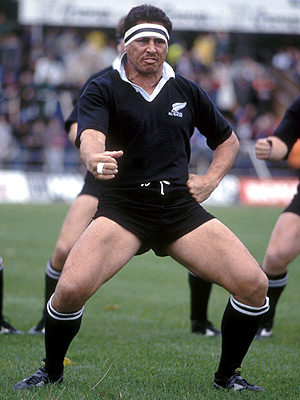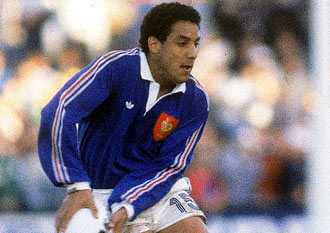Buck: I knew French were on drugs
An All Black legend whose scrotum was ripped open in an infamous 1986 Test match against France said he was not surprised at new allegations Les Bleus were on amphetamines at the time.
Wayne Shelford, affectionately known as Buck, was the most prominent casualty in the so-called "Battle of Nantes", when a fired-up French team brutally attacked New Zealand to seize a 16-3 victory.
Shelford was caught at the bottom of a ruck 20 minutes into the game, losing four teeth, and sustained a large tear to his scrotum courtesy of a stray French boot.
Incredibly, Shelford had his injury stitched on the sideline and played on until deep into the second half, when a knock to the head left him concussed and unable to continue.
 Shelford, who went on to play 22 Tests and captain the All Blacks, said he always suspected some of the French were on drugs, an allegation made in a book by investigative journalist Pierre Ballester.
Shelford, who went on to play 22 Tests and captain the All Blacks, said he always suspected some of the French were on drugs, an allegation made in a book by investigative journalist Pierre Ballester.
"When I came out of the tunnel and I saw them, I looked into the eyes of many of the players as I walked past them, and their eyes did not say that they were going into a game against the All Blacks," he told Radio New Zealand.
"Their eyes just looked like they were on something, and I could not prove it."
The French team doctor at the time, Jacques Mombet, told Ballester that the Nantes Test was the most obvious example of French players using amphetamines.
He said New Zealand realised their opponents were "loaded" and made a complaint to the International Rugby Board, which eventually led to a clampdown.
"The Blacks realised that their opponents, unrecognisable from the previous week, were loaded," Mombet said in Ballester's book.
Ballester wrote that he asked the doctor whether that meant legends such as Serge Blanco, Philippe Sella and Pierre Berbizier were involved.
All played in the New Zealand game.
"No, not them. Or at least it was very exceptional," the doctor was quoted as saying.
France's rugby establishment, including Blanco, the current French Rugby Federation Vice-President, did not immediately react to the allegations.
Former French prop Laurent Benezech said in 2013 that drug-taking in rugby in the 1980s was the same as in cycling.
Others, like ex-France coach Bernard Laporte, have also acknowledged that drugs were taken. Laporte told a French parliament hearing in 2013 players took drugs without knowing they were banned.
Jean-Pierre Elissalde, a former French scrumhalf whose playing career lasted from 1973-1988, said in an interview with Le Figaro newspaper that "the sports world was stuffed with drugs in the 1970s and 1980s."
Ballester also wrote a 2004 book on disgraced cyclist Lance Armstrong, in which he was among the first to publicly make drug allegations against the seven-time Tour de France winner.
 The injury to Shelford, one of the game's legendary hard men, has reverberated down the years as one of the most horrifying incidents in the sport.
The injury to Shelford, one of the game's legendary hard men, has reverberated down the years as one of the most horrifying incidents in the sport.
"I was knocked out cold, lost a few teeth and had a few stitches down below. It's a game I still can't remember… I don't really want to, either," he once said.
According to the Mombet book the French national team was a "vast consumer" of amphetamines in the 1980s.
"They each had their little pill in front of their plates for the meal before the match," French team doctor of the time, Jacques Mombet, is quoted as saying in the book.
Ballester's book, "Rugby a Charges, l'enquete choc" (The case against rugby) is released in France on March 5.
Ballester's book also casts doubt on the use of supplements by some current players.
He said some substances could not be detected or were so new they were not yet known.
Agence France-Presse









































